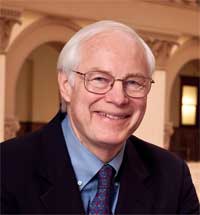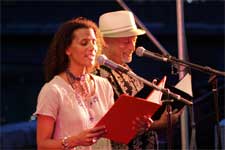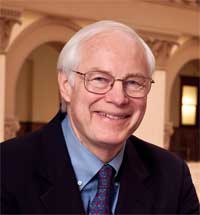 KINGSTON, R.I. – March 6, 2013 – James A. Leach, chairman of the National Endowment for the Humanities and a former Republican congressman from Iowa, is giving a talk at the University of Rhode Island this month for the third annual spring humanities festival.
KINGSTON, R.I. – March 6, 2013 – James A. Leach, chairman of the National Endowment for the Humanities and a former Republican congressman from Iowa, is giving a talk at the University of Rhode Island this month for the third annual spring humanities festival.
Leach will talk about the future of literature, philosophy, history, languages, religion, and the arts in “The Centrality of the Humanities in a STEM-Centric World” at 7:30 p.m., March 27 in the Lippitt Hall auditorium, Room 402. The talk is free and open to the public.
A longtime supporter of the arts, Leach will discuss the importance of the humanities in an era when higher education is placing more emphasis on science, technology, engineering, and math, or STEM. Those disciplines are vital, but with each advance in science and technology the humanities become just as important.
Consider this: As improvements in transportation bring people throughout the world closer together and as trade becomes more globalized it’s critical that people understand and expose themselves to different cultures to lessen conflicts.
“Chairman Leach will convey invaluable insight about the arts and humanities in America today during his campus visit,” said URI President David M. Dooley. “Those who care about the future of our culture and the humanities will benefit from what promises to be a compelling and timely talk.”
Galen A. Johnson, director of the URI Center for the Humanities and chairman of the philosophy department, said he’s known Leach for several years and is delighted he’s the keynote speaker.
“We are thrilled to host Chairman Leach at our flagship state university,” said Johnson. “This is a coup for URI to get the leading spokesman for the humanities in the United States.”
 Born in Davenport, Iowa, to a father who was a lawyer and a mother who loved to read, Leach excelled academically in high school and also became a state champion wrestler in the 138-pound weight class. (He once said that a wrestling mat is the most “equalitarian place” in the world.)
Born in Davenport, Iowa, to a father who was a lawyer and a mother who loved to read, Leach excelled academically in high school and also became a state champion wrestler in the 138-pound weight class. (He once said that a wrestling mat is the most “equalitarian place” in the world.)
He received a bachelor’s degree in politics from Princeton University in 1964 and a master’s degree in Soviet studies from Johns Hopkins University. After serving in the Foreign Service, he was elected to Congress in 1976.
During his 30 years in the House of Representatives, Leach founded and was co-chairman of the Congressional Humanities Caucus, which supports public programs in the humanities. A leader on monetary policy issues, he also chaired the Banking and Financial Services Committee, the Sub Committee on Asian and Public Affairs, and the Congressional-Executive Commission on China.
Regarded as a moderate Republican, Leach was just one of six Republicans in the U.S. House of Representatives to vote against the resolution authorizing the Iraq war. He was known as a soft-spoken gentleman with a fondness for the arts, a passion he developed from his wife, Deba Leach, an art historian.
 After leaving Congress in 2006, Leach became a professor at Princeton University’s Woodrow Wilson School of Public and International Affairs. He was also interim director of the Institute of Politics at the John F. Kennedy School of Government at Harvard University.
After leaving Congress in 2006, Leach became a professor at Princeton University’s Woodrow Wilson School of Public and International Affairs. He was also interim director of the Institute of Politics at the John F. Kennedy School of Government at Harvard University.
When President Barack Obama appointed Leach in 2009, Leach told The New York Times that culture is bigger than politics and that the arts have the power to unite people rather than divide them.
“Our culture is more shaped by the arts and humanities than it often is by politics,” he told the Times. “In difficult times the arts, sciences, and humanities vastly increase in significance. And this is one of those times.”
Leach has said that one of his goals is to defend the organization from attacks by special interest groups inflaming public opinion with terms like “socialism” and “communism.” Some lawmakers have pushed to cut funding to the organization in tough economic times.
“The humanities are central to understanding ourselves and understanding others,” Leach has said. “How does one compete in the world unless one has a sense for how other people think and speak.”
It’s fitting, then, that the humanities festival this year at URI is “The Arts and Humanities in the New Economy.” The fest is sponsoring other related talks, also free and open to the public.
From 11:30 a.m. to noon, March 27 there will be a live taping of the “Beauty Salon” radio show in Lippitt Hall, Room 402. Karen de Bruin, an assistant professor of French at URI, will host the program.
From 2 to 2:50 p.m., March 27 at the University Club, Wendy Roworth, a professor of art and art history, will talk about “Angelica Kauffman’s Art Collection: An Enterprising Artist in 18th century Rome.” Roworth is a winner of the URI 2012 Center for the Humanities Sabbatical Fellowship.
From 3 to 4 p.m., March 27, at the University Club, a panel of recent URI humanities graduates will talk about what they’ve done with their lives since graduation. The panelists are: Rachel Walshe ’02, a Rhodes Scholar winner and theater director in Chicago, Boston, and Providence; Jonathan Hardge ’94, information systems senior test analyst for CVS Caremark; and Isaac Mamaysky ’05, a New York lawyer who recently received a $1.2 million grant to start Camp Zeke, a summer camp for children in the Northeast that focuses on active living, culinary arts, and nutrition. Mamaysky teaches philosophy at The City University of New York, or CUNY.
From 4 to 5 p.m., March 27 Rebekah Greene, a graduate student in English, will present a graduate student colloquium in the Hoffmann Room at Swan Hall.
From 10 a.m. to 3 p.m., March 28 URI professors will talk about their current research supported by the URI Center for the Humanities Research Grants. All March 28 talks are in the Hoffmann Room at 154 Swan Hall:
• 10 to 10:30 a.m., a coffee reception and welcoming remarks by Johnson.
• 10:40 to 11:10 a.m., David Faflik, assistant professor of English, “Boarding Out: Inhabiting the American Literary Imagination.”
• 11:20 to 11:50 a.m., Erik Loomis, assistant professor of history, “Timber Worker Safety and the Origins of Blue-Green Coalitions in the Pacific Northwest.”
• 1 to 1:40 p.m., Gina Valentino, assistant professor of English, “Inescapable Loss: Gambling and Social Extinction in Louis Owen’s Bone Game.”
• 1:45 to 2:15 p.m., Mary Hollinshead, professor of art and art history, “Supporting Identity in Roman Sculpture.”
• 2:20 to 2:50 p.m., Robert Van Horn, assistant professor of economics, “From Jewish Radical and Labor Education Leader to Conservative Economist: A Biographical Account of Aaron Director’s Early Life.”
The festival is also sponsoring two performance events.
From 3:30 to 4:45 p.m., March 28, a performance of Triple Decker will be held in the Lippitt Hall auditorium, Room 402, featuring musicians and storytellers Valerie Tutson and Marc Levitt.
The show is a one-hour story, with music, about the history of a triple-decker tenement in South Providence, R.I., and the six families from six immigrant groups who lived in the house over 60 years.
These groups of Armenians, Cape Verdeans, Dominicans, Cambodians, Africans, and Irish change themselves, each other, and the idea of what being an American means during their daily interactions.
From 5 to 6 p.m., also March 28, Bill Harley, a two-time Grammy award-winning artist, will perform, also in the Lippitt Hall auditorium, Room 402. Harley is a recipient of a Lifetime Achievement Award from the Rhode Island Council for the Humanities and a commentator on National Public Radio. Harley’s songs paint a vibrant picture of growing up, school days, and family life.
The two-day festival is sponsored by the URI Center for the Humanities; the URI Honors Program; the URI Beauty Salon; the Rhode Island Labor History Society; Winifred Brownell, dean of the College of Arts and Sciences; Peter Alfonso, vice president for research and economic development; Donald DeHayes, provost and vice president for academic affairs; URI President David M. Dooley, and the Ken and Sue Kermes Distinguished Lecture Endowment.
“Professor Johnson and the Center for the Humanities have prepared an impressive array of exciting programs for the festival,” said Brownell. “We are particularly delighted that NEH Chairman James Leach will join us to discuss the central role of the humanities in our STEM-centric world.”
For more information about the festival, please contact Johnson at gjohnson@uri.edu and 401-874-5700. Also, please visit the center’s website at http://www.uri.edu/artsci/cfh.
Pictured above: James A. Leach, chairman of the National Endowment for the Humanities.
Photo courtesy of National Endowment for the Humanities
Marc Levitt and Valerie Tutson, members of Triple Decker performance group.
Photo by Viera Levitt
Bill Harley, singer, storyteller, and performing artist.
Photo courtesy of Bill Harley

